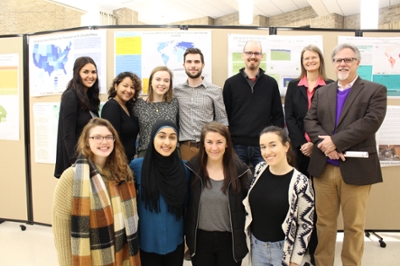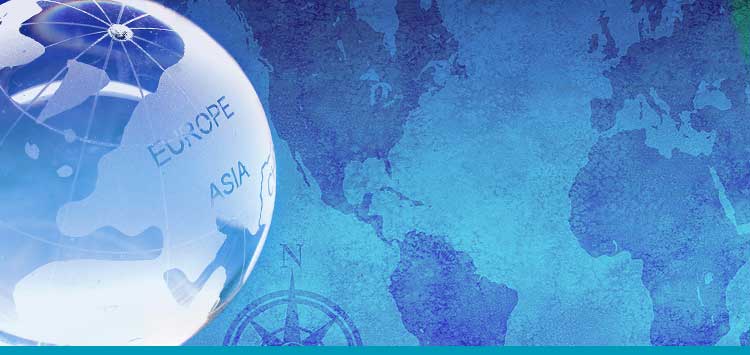Global Studies and Geography Students Participate in Fall 2017 Undergraduate Research Day
On Tuesday, December 12th, the Department of Global Studies and Geography had eleven students presenting posters from their semester-long research projects for Undergraduate Research Day (making up an impressive 28% of all the Hofstra UG presentations!).
Dr. Craig Dalton, Assistant Professor of Global Studies and Geography, supervised the Intermediate and Advanced GIS projects while Dr. Kari Jensen, Associate Professor of Global Studies and Geography, supervised a Geography Honors Thesis project.
As in the past, the topics studied covered a broad range of material. Among them were submissions from juniors Christina Paccadolmi and Lois Paquette and senior Connor Mayes whose poster was based on his Geography Honors Thesis:
Christina believes that the government needs to better enforce its disability rights acts. She calculated the rates of people with disabilities in the workforce by mapping the percentages of people with disabilities per state. She discovered that only 9 states were able to meet the 7% quota of registered employees having a disability as outlined in the Rehabilitation Act of 1973, with the remaining 41 states fell below the minimum standard.
Lois wanted to explore the diversity and ethnic distribution of the pre-WWI Ottoman Empire. She focused on three groups, as defined by the census data from the 1890s: Greeks, Armenians, and Muslims, and found that the diversity of the Ottoman Empire foreshadowed the countries that would ultimately form post-WWI.
Connor was frustrated that most academic genocide literature always focused on the intangible motivations (e.g. cultural/religious/ethnic differences) despite the results being very tangible (e.g. the destruction of lives). His research, including a case study of the 1992-1995 Bosnian Genocide, found ample evidence of the physical motivations behind genocidal events, which included natural resource extraction, territory expansion and the desire for human slaves.
The full list of our presenters and topics is:
Emilie Beck (Global Studies, Geography) presented: Military Bases and Air Pollution in the U.S.
Rachel Billiard (Global Studies, Geography) presented: U. S. Island Territories at Risk of Sea Level Rise
Ligia Clara (Global Studies, Geography) presented: Male Stomach Cancer Cases Worldwide in 2012
Marissa Duhaney (Global Studies, Geography) presented: Countries’ Efforts to Stop Human Trafficking
James Eager (Global Studies, Geography) presented: Imagining a Greener Manhattan
Adriana Galarza (Global Studies, Geography) presented: How Much Food is in Your Glyphosate?
Connor Mayes (Global Studies, Geography) presented: Ruling the Bloodlands: The Relationship between Space, Resources and Genocide
Malcolm McCoy (Global Studies, Geography) presented: Distance Between U.S. Installations and U.S. Interstates
Fatimah Mozawalla (Geography) presented: Separate but Equal? An Analysis of School District Funding in Relation to Race on Long Island
Christina Paccadolmi (Global Studies, Geography) presented: Disability Employment in the United States
Lois Paquette (Geography) presented: Mapping the pre-WWI Ottoman Empire
Congratulations to all of the presenters and thank you to Drs. Dalton and Jensen for your support and guidance!

Pictured (l-r) back: Adriana Galarza, Ligia Clara, Lois Paquette, Connor Mayes, Dr. Craig Dalton, Dr. Kari Jensen, Dr. Grant Saff; front: Emilie Beck, Fatimah Mozawalla, Christina Paccadolmi, Rachel Billiard (missing from photo: James Eager, Malcolm McCoy)
Click on the above photo to view the full album on Flickr.
